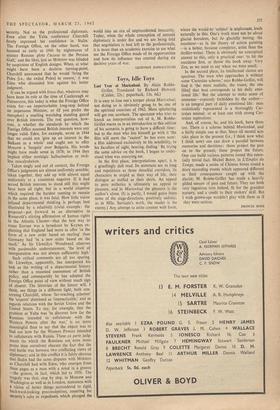Toys, Idle Toys
Last Year at Marienbad. By Alain Robbe- Grillet. Translated by Richard Howard. (Calder, 22s.; paperback, 13s. 6d.) IT is easy to lose one's temper about Marienbad; not doing so is obviously going to be one of the spiritual exercises of 1962. Mere spluttering will get one nowhere. The spectator who tries to knock an interpretation out of it, M. Robbe- Grillet warns us in an introduction to this edition of his scenario, is going to have a difficult time: but to the man who lets himself go with it 'the film will seem the "easiest" he has even seen: a film addressed exclusively to his sensibility, to his faculties of sight, hearing, feeling.' By trying the same advice on the book, I began to under- stand what was annoying me.
In the first place, interpretations apart, it is a gruellingly dull read. Its sentences are as long and repetitious as those dreadful corridors, its characters as stupid as their way of life, their dialogue as stuffed as their shirts. An appeal to pure esthetics is ultimately an appeal to pleasure, and in Marienbad the pleasure is the author's alone. (It is partly, I would guess from some of the stage-directions, positively sadistic; as in Mlle. Sarraute's work, the reader is the enemy.) Any, attempt to unite content with form, where the would-be 'subject' is unpleasant, leads naturally to this. One's work must not be about glacial boredom, but be glacially boring; the murderer—as in the theory of action painting —is a better, because completer, artist than the thriller-writer. There is obviously no conceptual answer to this, only a practical one: to hit the murderer first, or throw the book away. Very Zen, as we used to say when we were small.
In the second place, its intellectual claims are specious. The man who approaches it without some `Cartesian scheme,' says Robbe-Grillet, will find it `the most realistic, the truest, the one [film] that best corresponds to his daily emo- tional life.' But the attempt to make sense of nonsense—expressly forbidden by the author— is an integral part of daily emotional life: man realistically represented is a thoroughly Car- tesian animal; or at least one with strong Car- tesian aspirations.
And, of course, he, and his book, have them too. There is a scheme behind Marienbad, and a fairly simple one at that. Since all mental acts take place in the present (i.e., I think now what I think now) one can draw a parallel between memories and decisions: those project the past on to the present, these project the future. One can build various patterns round this essen- tially trivial fact. Michel Butor, in L'Emploi du Temps, made a series of Chinese boxes round a diary recording events which appeared different as their consequences caught up with the diarist; M. Robbe-Grillet has made a heavily gilded seesaw of past and future. They are both very ingenious toys indeed, fit for the grandest nursery, and a credit to their makers' skill. But I wish grown-ups wouldn't play with them as if they were serious.
FRANCIS HOPE


































 Previous page
Previous page